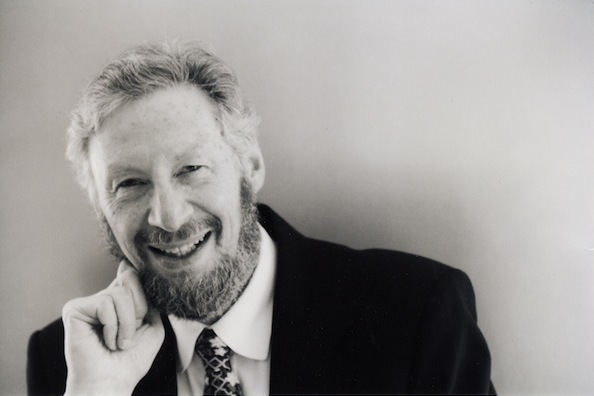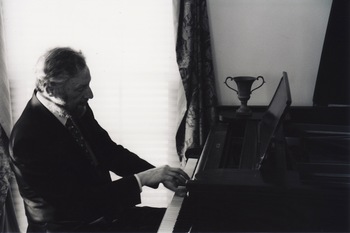Howard Karp, pianist and musical patriarch, dies at 84

Howard Karp, pictured in 2000, died June 30 at the age of 84. The patriarch of a prolific musical family, he was a professor emeritus of piano in the UW–Madison School of Music.
For many music lovers, the Madison concert season begins with the annual Karp Family Concert each Labor Day. In 38 years, three generations of the Karp family — piano, cello, violin, viola and spoken word — never repeated a piece, premiering new works and celebrated masterpieces in front of some of Mills Hall’s largest crowds.
Patriarch Howard Karp, professor emeritus of piano at the University of Wisconsin–Madison, died of complications of cardiac arrest on Monday, June 30 at the Medical Center of the Rockies in Loveland, Colorado, close to his beloved summer home in Estes Park, surrounded by his wife and sons. He was 84.
“Howard Karp was an inspirational presence as both an educator and performer,” says Susan Cook, director of the UW School of Music. “He taught generations of students and helped make the Wisconsin Idea international by recruiting pianists worldwide. His influence continues to shape the School of Music and its mission.”

“He was an incredible listener to sound . . . a detail man, insisting on attention not only to each note in its place, but that the spirit and soul of the music shone in every moment,” says former student Bill Lutes.
Photo: Katrin Talbot
Bill Lutes, a former student who became a colleague and close friend, first heard Karp’s “utterly astonishing, fearless” performances as a high school student in Kentucky.
“He was an incredible listener to sound . . . a detail man, insisting on attention not only to each note in its place, but that the spirit and soul of the music shone in every moment,” says Lutes.
Read more of Bill Lutes’ rememberance of Howard Karp.
Born in Chicago on October 12, 1929, Howard Karp did not consider himself a particularly promising musician at first.
“I wasn’t very good as a child,” he said in a 1994 Isthmus interview. “I really didn’t enjoy it. I had a teacher who was very strict, and he wouldn’t let me play any pieces, just technic” — endless finger exercises meant to discipline and condition a pianist’s hands.
“Even if I hated a student,” Karp said with a laugh, “I wouldn’t give them that stuff.”
At Oberlin Conservatory of Music, studying with highly regarded teacher Jack Radunsky, Karp struck up a romance with a classmate named Frances Reiche. The two were married for 62 years, becoming life partners and musical collaborators.
In a review of their four-disk recording “Howard and Frances Karp, Pianists: Concert Performances from a Half-Century of Music-Making,” former Capital Times music critic Jacob Stockinger wrote, “You won’t find a longer-lived partnership or a better melding of heart, mind, and fingers.”
The Karps moved on to Juilliard, where Howard studied with Rosina Lhevinne. His studies continued at the Akademie für Musik in Vienna (as a Fulbright Scholar) and in Positano, Italy, studying Beethoven with Wilhelm Kempff.
Returning to the United States, he taught at the University of Kentucky before securing a full professorship at the highly regarded Music School of the University of Illinois at Urbana-Champaign. As a performer, Karp won acclaim for solo and chamber music recitals throughout United States and Europe. In addition, he maintained an active performance schedule as soloist with American and European symphony orchestras.
“Howard Karp was an inspirational presence as both an educator and performer … His influence continues to shape the School of Music and its mission.”
Susan Cook
Karp’s 1972 arrival in Madison meant giving up a prestigious position in a well-developed program. But the “greater needs” of the smaller, still-growing UW School of Music posed an exciting challenge. He never regretted the move, particularly because of the presence of artists such as pianist Gunnar Johansen and the Pro Arte Quartet.
When cellist son Parry Karp joined the Pro Arte in 1976, the family cemented their legacy in Madison’s musical community. Though the Karp Family Concerts displayed world-class collaboration, they always held more than a touch of an evening musicale at home: simply making music with much-loved people and repertoire.
Endless chamber combinations included fellow Pro Arte members, physician/scientist-violinist/pianist son Christopher and Parry’s poet/photographer-violist wife Katrin Talbot, premieres by composer-performers such as Joel Hoffman, and even readings from granddaughters Isabel, Natasha and Ariana.
“It was not only a feast of music, but a feast of love: for the music and for each other, and for the community,” says Lutes. “It was a gift that the Karps have continued to give each year, to our everlasting gratitude.”
“After a concert in which he’d played a sublime Schubert sonata, he smiled, shrugged and said, ‘I’m just a plodding workman.’ Though the self-deprecation was good humored, the humility was genuine.”
Bill Lutes
Howard Karp’s enthusiasm for life extended well beyond music. Colleague Marc Fink recalls how Karp’s legendary memory included the batting averages of the entire 1945 Chicago Cubs squad — the last Cubs team to make it to the World Series. Lutes describes Karp’s ability to identify any tree or shrub with its Latin scientific name, and of his delight — in a May letter from Colorado — at watching a “pygmy nuthatch going down the trunk of a Ponderosa pine head first.”
Above all, friends and colleagues remember Karp’s humanity: always stretching a lesson as long as it would go to keep the momentum intact; always downplaying a tremendous performance with characteristic humility.
“After a concert in which he’d played a sublime Schubert sonata, he smiled, shrugged and said, ‘I’m just a plodding workman,’” recalls Lutes. “Though the self-deprecation was good humored, the humility was genuine. And so was the message: to play this kind of music, at this level, one had to give and give and give to the work, with unswerving devotion.”
Howard Karp’s survivors include his wife, Frances; sister, Myrna Soled; sons Parry and Christopher; daughters-in-law Katrin Talbot and Marsha Wills-Karp; and grandchildren Ariana, Natasha, Isabel and David.
Among Karp’s many recordings, a six CD set of solo concert performances was just released by Albany Records in May 2014.
Donations and contributions in his name may be made to the “Howard and Frances Karp Piano Scholarship Fund” of the University of Wisconsin Foundation, US Bank Lockbox, Box 78807, Milwaukee, WI 53278.
Update: The 2014 Karp Family Concert — originally scheduled for Sept. 1 — has now been cancelled. In its place is a tribute event in memory of Howard Karp on Sunday, Aug. 31, at 3 p.m. in Mills Hall of the George Mosse Humanities Building, 455 N. Park St. The public is welcome.
Tags: arts, obituaries




